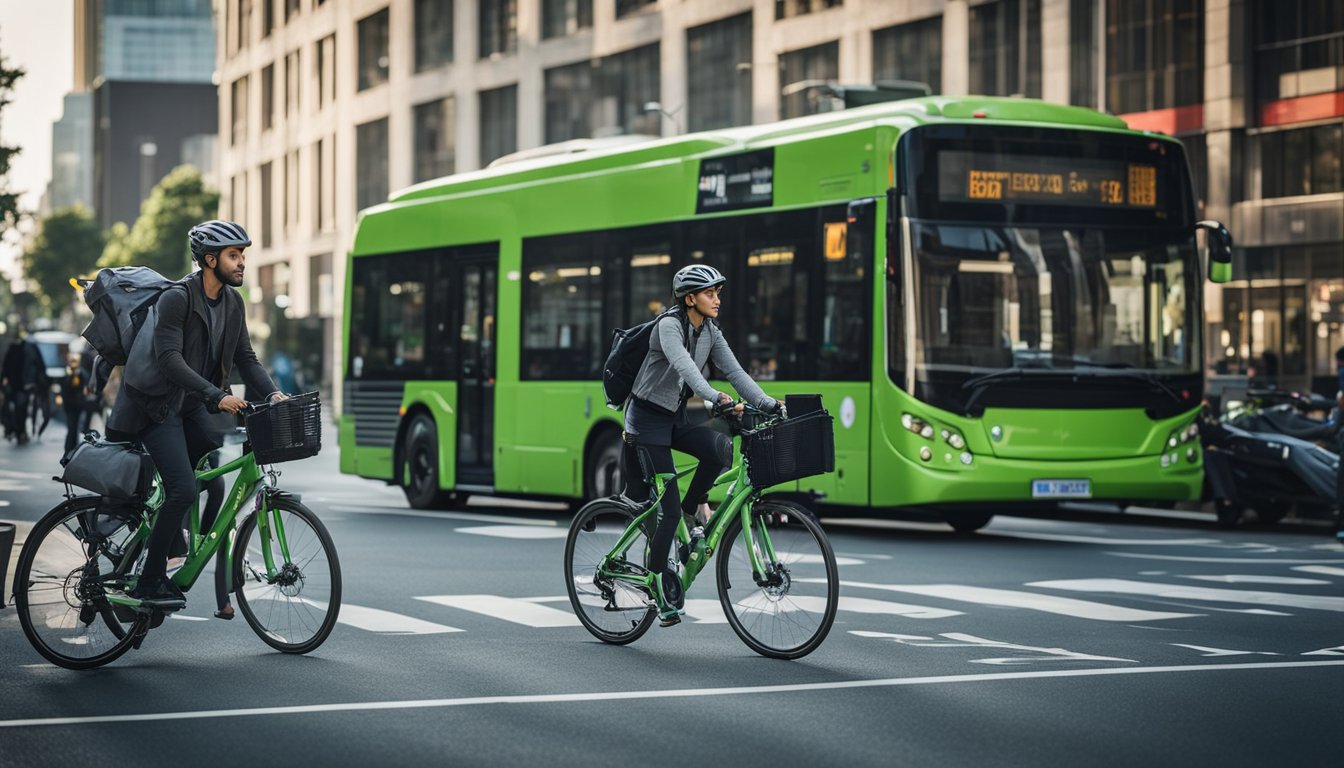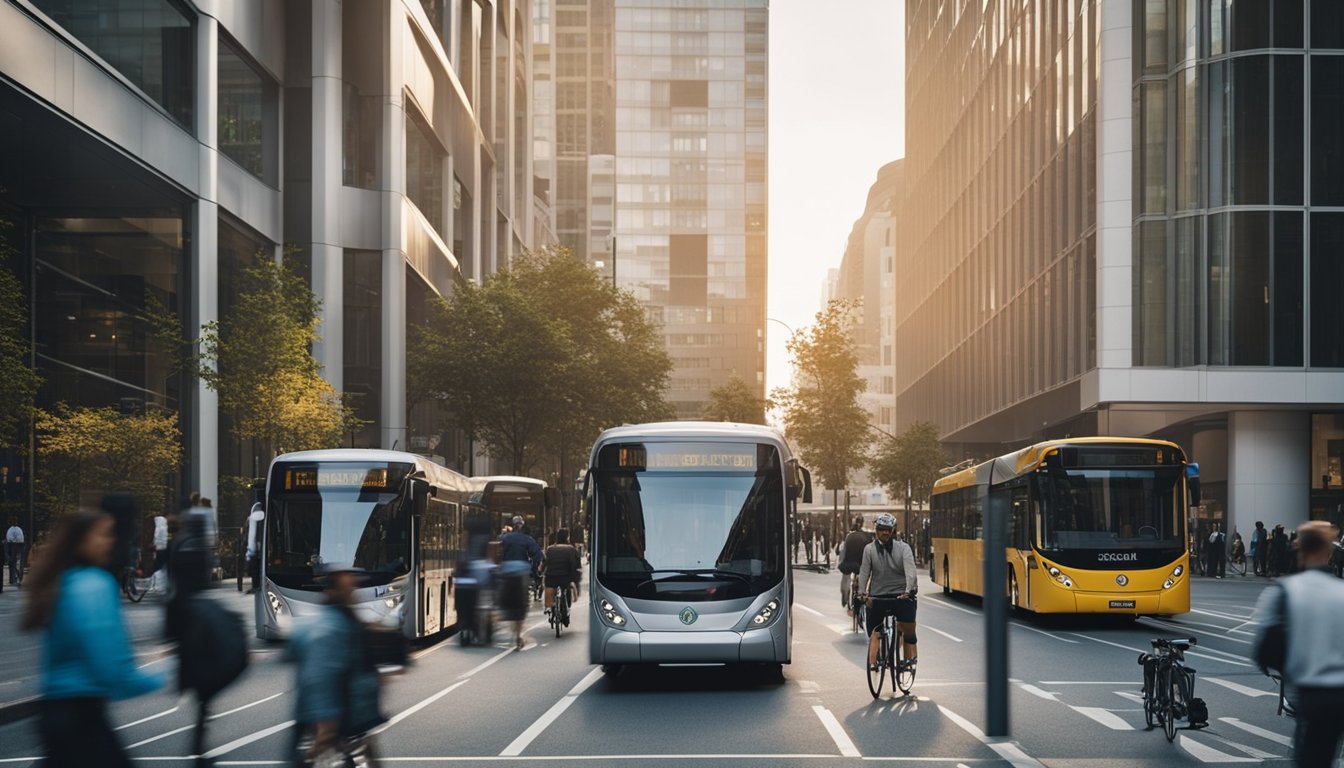Late updated: 24 Dec 2024 08:12
Written by: Amber Collins
Sustainable Commuting Initiatives For UK Businesses: Driving Green Transport Solutions
In today's rapidly evolving world, UK businesses are recognising the need for sustainable commuting initiatives to reduce environmental impact. Not only do these initiatives help decrease greenhouse gas emissions, but they also contribute to cutting overall carbon footprints, benefiting both the planet and organisational reputations. Sustainable commuting strategies enhance eco-friendly travel options while boosting employee satisfaction.

For businesses committed to going green, developing robust sustainable commuting policies is a pivotal step. These policies can range from implementing a green transport scheme to encouraging carpooling and increased use of public transport. Supporting the necessary infrastructure such as bike racks or electric vehicle charging stations further amplifies the effectiveness of these initiatives, ensuring that employees can adopt new commuting habits with ease.
The practical benefits of sustainable commuting extend beyond environmental gains, offering economic advantages such as reduced business travel costs and lower vehicle maintenance expenses. By understanding the critical role of sustainable transport, we can create a healthier work environment and align business practices with eco-conscious values.
Key Takeaways
- Implementing sustainable commuting policies reduces carbon footprints.
- Supporting infrastructure is crucial for successful adoption.
- Eco-friendly commuting boosts employee satisfaction.
Developing Sustainable Commuting Policies
Creating sustainable commuting options involves a range of strategies that UK businesses can adopt. These strategies, such as promoting public transportation or remote work, play a critical role in reducing carbon emissions and achieving net-zero targets.
Incentivising Public Transportation Use
Implementing financial incentives for employees who use public transport can significantly enhance participation. By establishing partnerships with local authorities, businesses can secure discounts on passes and integrate public transit options into employment packages.
Offering flexible work hours can also maximise the use of less crowded and more efficient transit options. Moreover, UK government grants and incentives can further assist in offsetting costs, facilitating an increase in sustainable commuting practices.
Promoting Cycling and Walking
Cycling and walking are not only environmentally friendly but also promote healthier lifestyles. Organisations can participate in the Cycle to Work Scheme, allowing employees to purchase bicycles through salary sacrifices, effectively reducing their taxable income.
Secure bike storage and changing facilities at the workplace are also crucial. Encouraging walking for shorter distances through initiatives such as walking groups or challenges can further reduce reliance on vehicular travel, lowering carbon emissions.
Implementing Remote Work Strategies
Remote work has become an essential part of sustainable commuting strategies. By leveraging digital communication and collaboration tools, we can minimise the need for daily travel, greatly reducing our carbon footprint.
Flexible remote work policies enable staff to plan their commuting around less congested periods, further aiding environmental efforts. This approach supports work-life balance, contributing positively to employee satisfaction and productivity.
Adopting Carpooling and Car-Sharing Schemes
Carpooling and car-sharing schemes can effectively reduce the number of individual car trips, cutting down on traffic congestion and emissions. Businesses can facilitate these by creating platforms or apps that connect employees travelling in the same direction.
By collaborating with car-sharing services, employers can offer discounted rates or incentives to employees who participate. This method can significantly contribute to achieving sustainability goals, while easing pressure on parking infrastructure.
Supporting Sustainable Commuting Infrastructure

Sustainable commuting infrastructure is crucial for reducing emissions and supporting low-emission vehicles and bicycles. By focusing on electric vehicle facilitation and secure bicycle facilities, we can ensure meaningful progress.
Facilitating Electric Vehicles Use
To support the transition to electric vehicles, installing workplace charging schemes is vital. These allow employees to charge their vehicles during work hours, reducing range anxiety. Implementing tax incentives for businesses investing in such infrastructure can further encourage this shift.
Shared transport options, like car pools, combined with incentives can maximise the use of electric vehicles. Partnering with local councils to improve public charging networks also broadens accessibility for all users. Promoting low-emission vehicles not only benefits environmental responsibility but also supports the move towards net zero targets.
Enhancing Secure Bicycle Facilities
Providing secure and accessible bicycle storage encourages employees to cycle to work. Implementing cycle-to-work schemes can further incentivise the use of bicycles. These schemes offer tax benefits, making bicycles more affordable for employees.
It's essential to ensure that bike storage facilities are weather-protected and located in secure areas. Improving the quality of cycling routes near business premises can also boost participation. Companies might consider offering bicycle maintenance workshops, supporting sustainable practices and enhancing employee wellbeing. Investing in these facilities contributes significantly to sustainable transportation and helps foster a culture of environmental responsibility.
Frequently Asked Questions

Sustainable commuting initiatives provide substantial benefits to UK businesses by addressing environmental concerns and enhancing employee well-being. By implementing effective transport schemes and leveraging government incentives, companies can lead the charge in promoting eco-friendly travel.
What examples of green transport schemes can UK businesses adopt?
UK companies can adopt initiatives such as cycle-to-work schemes, subsidising public transport passes, and incentivising carpooling. Additionally, converting corporate fleets to electric or hybrid vehicles reduces emissions. Installing bike racks and shower facilities for cyclists can support employees choosing greener commutes.
How can companies participate in the UK's sustainable transport strategy?
Engagement with national and local transport initiatives is crucial. Companies can collaborate with local councils to align with regional sustainable transport plans. Participating in government consultations and initiatives on eco-friendly commuting practices helps firms contribute to broader strategic goals.
Which measures are included in London's strategy for sustainable transport?
London's strategy involves expanding public transport options and promoting walking and cycling. Introducing ultra-low emission zones (ULEZ) aims to decrease vehicular pollution. Investment in electric vehicle infrastructure, including charging stations, supports the move to cleaner transport methods.
What initiatives can an enterprise take to promote sustainability within its business in the UK?
Enterprises can conduct sustainability audits to identify areas for improvement. Establishing green procurement policies and opting for energy-efficient office appliances contribute to overall sustainability. Encouraging remote work or flexible schedules reduces the need for daily commuting, further minimising the company's carbon footprint.
What government incentives are available for UK businesses to encourage sustainable commuting?
The UK government offers incentives such as grants for purchasing electric vehicles and subsidies for installing charging infrastructure. Tax benefits for businesses that implement cycle-to-work schemes or provide public transport tokens encourage greener commuting alternatives.
How can UK businesses effectively implement a sustainable commuting plan for their employees?
Developing a comprehensive commuting plan involves assessing employee needs and available resources. Engaging staff through surveys to understand commuting preferences helps tailor solutions. Providing clear communication and support, including incentives and resources, fosters successful adoption of sustainable commuting practices.
